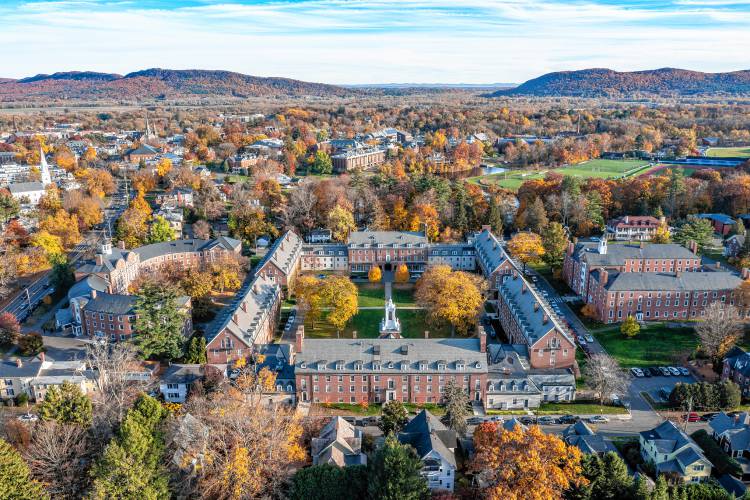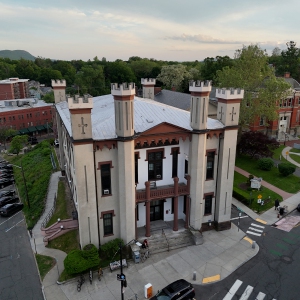Columnist Carrie N. Baker with Andrea Moore: In defense of higher education and critical thinking

Smith College GAZETTE FILE PHOTO
| Published: 03-26-2025 5:32 PM |
In 2021, now-Vice President J.D. Vance gave a speech titled ”Universities are the Enemy.”
“We must aggressively attack the universities in this country,” said Vance, suggesting it was time to “seize the endowments” and “penalize [universities] for being on the wrong side of some of these culture war issues.” Vance concluded with a quote from Richard Nixon: “The professors are the enemy.”
Now that Vance and Donald Trump are in the White House, higher education is in the crosshairs. Immediately upon taking office, the Trump/Vance administration began working to dismantle higher education in the United States, closely following The Heritage Foundation’s Project 2025 policy agenda. On Feb. 14, for example, the Department of Education released a “Dear Colleague” letter, demanding the elimination of all programs to increase diversity, equity and inclusivity at universities and colleges. From blocking National Institutes of Health funding to issuing threatening executive orders, and eliminating funding for libraries and the Department of Education, the Trump/Vance administration has made it clear that they are gunning for colleges and universities.
Why are Trump and Vance so threatened by institutions of higher education? One likely reason is that these institutions have opened their doors to women, people of color and immigrants, and developed new fields of study such as women’s and gender studies, race and ethnic studies, and Latin American studies. These fields have challenged the universality of white cisgender male perspectives and their canons, which historically ignored the lives of people who are not white and male.
By incorporating a more diverse, multifaceted constellation of ideas, higher education has decentered white men — many of whom have responded with resentment — and exacerbated increased workplace competition from more accomplished women, people of color and immigrants. Trump and Vance have been exceptionally effective in tapping into the resulting resentment and fear.
Over the last several weeks, a number of think pieces have been published about the current conditions and immediate future of higher education in this country. In a recent roundtable in the New York Times columnist Bret Stephens wrung his hands about a generation of “easily offended” college students, mocked the idea of a “studies” degree of any kind, and insisted that college was often “not worth it,” implying that while Trump’s attacks were excessive, a deep reckoning was overdue.
M. Gessen and Tressie McMillan Cottom, on the other hand — both gender and racial or ethnic minorities who actually work in higher education — argued that they did not recognize the caricatures of higher education created by the right, and that cuts in federal funding were strictly punitive. In fact, these cuts and rhetorical attacks follow a playbook created in part by “activist” Christopher Rufo, the architect of New College of Florida’s hostile takeover by the state of Florida.
“A medium- or long-term goal of mine,” said Rufo, “is to figure out how to adjust the formula of finances from the federal government to the universities in a way that puts them in an existential terror.”
Article continues after...
Yesterday's Most Read Articles
 Northampton Housing Authority boss placed on leave
Northampton Housing Authority boss placed on leave
 NCAA Div. 1 Men’s Ice Hockey: UMass stuns Minnesota 5-4 in OT, advances to regional final
NCAA Div. 1 Men’s Ice Hockey: UMass stuns Minnesota 5-4 in OT, advances to regional final
 UMass Men’s Basketball: Three Minutemen enter transfer portal
UMass Men’s Basketball: Three Minutemen enter transfer portal
 Easthampton schools adopt $22.8M budget with no layoffs; enrollment decline, student needs a concern
Easthampton schools adopt $22.8M budget with no layoffs; enrollment decline, student needs a concern
 Area property deed transfers, March 28
Area property deed transfers, March 28
 Fire ravages Lincoln Street home in Holyoke
Fire ravages Lincoln Street home in Holyoke
At the core of all this hostility is not an ethical rethinking of higher education — which would hardly be an appropriate task for its sworn enemies in any case — but far more familiar projects: the crushing of dissent and academic freedom, which indeed tends to take aim at autocracy; fear of an empowered generation of students taught to think critically and independently, which will not play along with the lies of any administration; a desire to shape a one-sided and fictive national narrative; and a need to maintain social and class hierarchies in ways that ultimately feed profits and little else.
This attack on higher education is nothing new, but it aligns the U.S. with regimes that, until recently, it was safe to assume everyone agreed stood in contrast to the American self-image — the Nazis and the Argentinian junta, for example — both of which attacked academia and explicitly believed that “professors are the enemy.”
There are many arguments to be made in support of our higher education system, from the jingoistic — ours is arguably the most significant education system in the world and a destination for many — to the economic: undermining higher education is destructive to local and regional economies, and leads to brain drain, less global competitiveness, and intellectual decline.
Of course, the last may well be a goal of the current regime, considering that during his 2016 campaign, Trump said “I love the poorly educated.”
The college or university classroom is a place to try out ideas, to think carefully and critically, to read the arguments of others, and to practice the articulation of one’s position. The aggrieved, petty, and thin-skinned leaders of the current regime cannot abide this scrutiny. All the more reason for us to double down on our mission of cultivating critical thinkers able to see through their lies and manipulations.
Carrie N. Baker is a professor in the Program for the Study of Women and Gender at Smith College and a regular contributor to Ms. Magazine. Andrea Moore was recently tenured and promoted to associate professor in the Department of Music at Smith College.






 Guest columnist Donald Joralemon: First, they came for the idea of the common good
Guest columnist Donald Joralemon: First, they came for the idea of the common good Rosemary Seifert-Graf: We must protect IMLS
Rosemary Seifert-Graf: We must protect IMLS Marc Warner: Mayoral competence? Look at results
Marc Warner: Mayoral competence? Look at results Robin Jaffin: Silence is not an option
Robin Jaffin: Silence is not an option
